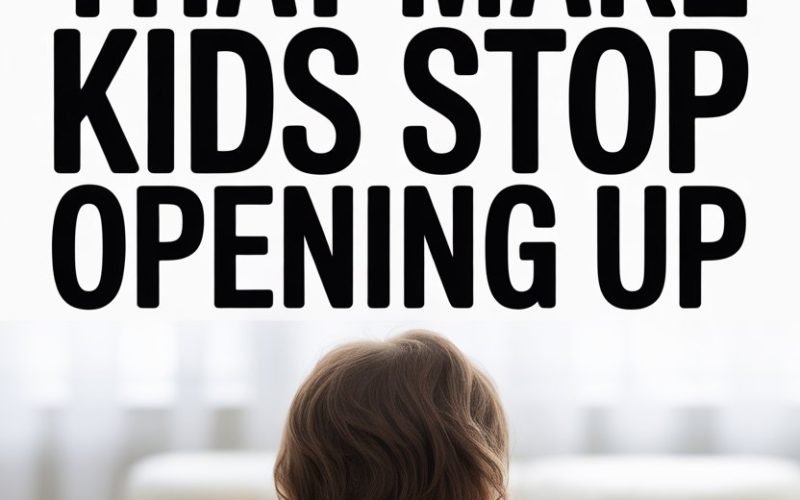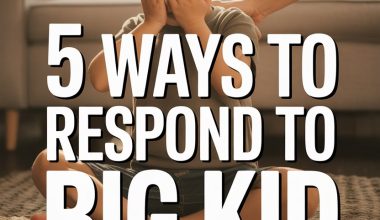If you’ve ever asked your child how their day was and received a grunt, a single syllable, or a noise that may or may not be “fine,” you’re far from alone.
Getting kids to share the inner workings of their hearts and minds can feel like trying to coax a cat into a bath—equal parts patience, strategy, and luck.
But when children clam up, it’s rarely random.
Certain patterns in parenting and family life can slam the conversational door shut. Let’s spot the culprits, and swap them for a little more connection.
1. Jumping Straight to Solutions
Picture this: Your kid comes home, drops their bag, and sighs, “School was awful.” Instinct kicks in.
You channel your inner fixer and rattle off ideas: “Did you talk to your teacher? Try sitting with someone else at lunch?”
Turns out, this is the conversational equivalent of handing someone a map before you let them say where they want to go.
Psychologist Lisa Damour points out that children (and adults, to be fair) aren’t always looking for answers right away—they want to feel heard Damour’s advice on active listening.
Leaping into rescue mode tells your child you’re uncomfortable with their distress.
Over time, they learn: Don’t bring up tricky stuff unless you want an unsolicited TED Talk.
What helps instead? Bite your tongue. Literally, if needed. Try: “That sounds rough. Want to tell me more?” Or, “Do you need advice, or just a sympathetic ear?”
Kids soak up empathy like a sponge. Problem-solving can wait until they’ve had their say.
2. Responding with Judgment or Disapproval
Admit it—most of us have a lurking “parent-judge” persona. Maybe it leaps out when your child confesses to not handing in their maths homework or shares a truth that chafes against your values.
The reflex: lecture, correct, or scold.
But for a child, nothing shrinks the urge to share quite like the fear of being judged.
A University of Washington study found that teens who felt judged by their parents were less likely to discuss sensitive topics Research on parental judgment and teen disclosure.
The trick isn’t to abandon your values, but to park the gavel. When your child tells you something eyebrow-raising, aim for curiosity over condemnation.
“What was going through your mind?” beats “You did WHAT?!”
You can circle back to expectations later, ideally when the smoke has cleared and everyone’s tempers have cooled.
If you want your child to trust you with the hard stuff, create a space where hard stuff is welcome—even if it makes your inner judge sweat.
3. Being Too Busy or Distracted
Some days, parenthood is a circus act—juggling schedules, dinner, emails, and the ever-present laundry pile. But chronic distraction sends a clear message: Your stories can wait behind these other priorities.
Kids notice. And when it happens often, they may stop trying to share at all.
There’s research showing that children whose parents are frequently on their phones feel less emotionally connected Study on parental phone use and emotional connection.
The good news? Small shifts make a difference. You don’t need to wield a colour-coded calendar or host nightly family meetings.
Try a “10-minute check-in” at bedtime with all devices out of sight. Or a conversation in the car on the way to footy practice.
Kids pick odd moments to open up—often when you’re not looking directly at them.
If you’ve been distracted lately, name it: “I realise I’ve looked glued to my screen. I want to hear what’s going on with you.” That vulnerability models what real connection looks like.
4. Overreacting or Taking Over the Conversation
Ever find yourself gasping, “WHAT?!” before your child finishes their sentence? Or hijacking their story with a tale from your own school days? (Guilty as charged.)
When parents overreact or take centre stage, they squash the tiny, fragile bud of sharing.
Children quickly learn which topics trigger adult meltdowns. Cue the self-censorship. Or worse, they stop telling you things altogether, assuming your reaction will be bigger than their problem.
According to Dr. Laura Markham, staying calm and reserving emotional fireworks encourages kids to keep confiding Advice on calm responses and communication.
A measured, “Thanks for telling me. Give me a second to think about that,” buys you time and shows your child that their truth won’t send you into orbit.
And if you catch yourself monologuing about the Good Old Days, pause and hand it back: “But enough about me—what happened next for you?”
Sometimes the best response is a well-timed “Hmm, tell me more.”
5. Minimising Their Feelings or Experiences
Everyone’s been there—your child is weeping over a squabble that, to your adult brain, seems about as significant as running out of milk.
The urge to say, “It’s not a big deal,” or, “You’ll laugh about this one day,” is strong.
But it’s a fast track to shutting down. When kids feel like their feelings are being brushed aside, they start to wonder if opening up is worth the effort.
Research from Harvard underscores that emotional validation is a key ingredient for secure parent-child relationships Harvard study on emotional validation and child well-being.
Instead of minimising or offering forced optimism, try echoing their feelings: “That sounds really upsetting,” or, “I can see why you’re frustrated.”
Even if the problem seems pint-sized, the feelings are real. You don’t have to agree, but you do need to acknowledge.
If you’re feeling clever (or British), a wry “Crikey, that’s rough,” can go a long way. Humour, when gentle, is often balm for the soul.
Bringing Back the Chatter
Every child is different, and some naturally reveal more than others (just as some adults could narrate a trip to the letterbox like it’s an action film).
But an open line of communication isn’t about prising confessions from tiny vaults. It’s about proving, with every interaction, that you’re a safe harbour.
If you’ve spotted yourself in any of these habits, don’t panic or spiral into guilt. Kids are forgiving, especially when parents own up to their missteps.
Even a sheepish “I realise I’ve been jumping in with advice—trying to fix things too quickly. I’m working on it,” can work wonders.
Next time your child offers up a worry, a win, or even a throwaway detail, see it as a gift. Listen with your full attention, hold back the solutions for a beat, and keep your reactions in check.
The more you make space for their voices, the more those voices will grow.
You can’t guarantee a nightly heart-to-heart (and if you have a teen, you may just get a grunt for your trouble).
But with practice, patience, and a dash of humour, you’ll keep the door open—and that’s where the good stuff happens.





